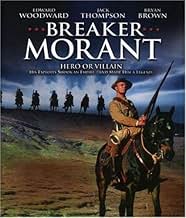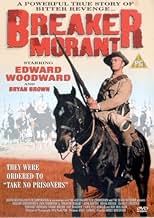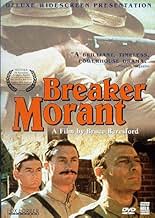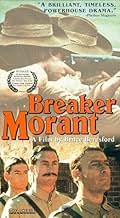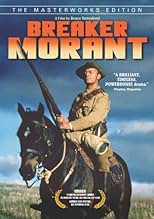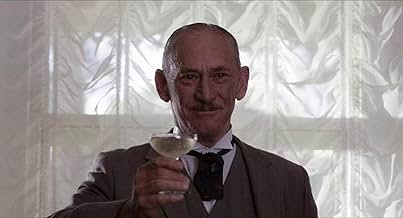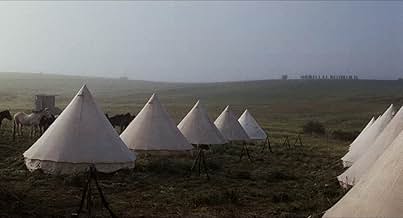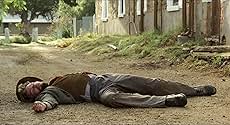AVALIAÇÃO DA IMDb
7,8/10
15 mil
SUA AVALIAÇÃO
Três tenentes australianos são julgados por executarem prisioneiros para desviar a atenção dos crimes de guerra cometidos por seus oficiais superiores.Três tenentes australianos são julgados por executarem prisioneiros para desviar a atenção dos crimes de guerra cometidos por seus oficiais superiores.Três tenentes australianos são julgados por executarem prisioneiros para desviar a atenção dos crimes de guerra cometidos por seus oficiais superiores.
- Direção
- Roteiristas
- Artistas
- Indicado a 1 Oscar
- 13 vitórias e 8 indicações no total
Charles 'Bud' Tingwell
- Lt. Col. Denny
- (as Charles Tingwell)
Avaliações em destaque
Truly great drama based on a real story. The camerawork is simple & not flashy, allowing the great script & magnificent ensemble cast to shine. There isn't one weak acting performance in this film, the standouts being Jack Thompson (in my opinion, his best ever performance)& Woodward in the role of "Breaker" Morant. Gripping drama that has aged well over 23 years. A must see 9/10.
Edward Woodward, better known to American audiences as the Equalizer, plays the title role in this military courtroom drama set during the Boer War. Woodward who had a well known reputation as a rollicking writer of the Australian frontier was one of three men charged with murdering several prisoners during the Boer War, one of them happened to be a German missionary. That got Kaiser Wilhelm's back up and the British were not looking for intervention from him on the Boer side. One must remember that the Germans did have a presence in Africa at the time. The diplomatic situation was not unlike the Korean War before the Chinese intervened.
What to do, but find someone to take the fall. Certainly not Lord Kitchener the commander of British forces in South Africa who let it be known quite unofficially and not on paper for attribution that he really wouldn't care if Boer Prisoners were shot. Edward Woodward, Bryan Brown and young Lewis Fitzgerald, get selected for a court martial. This is not unlike the more famous incident in the French Army during World War I as depicted in Paths of Glory.
The Australians to this day feel that these men were singled out because they were Australians and not British. Wouldn't do to have His Majesty's subjects, let alone the commander be held responsible. While the Boer War was going on, the various colonies on the Australian continent coalesced and formed a nation. Why the Australian government didn't protest more vigorously is something I'm not quite understanding.
That however does not detract from Breaker Morant being the fine film it is with sterling performances all around. Jack Thompson is the defense attorney in this court martial and does a splendid job in the face of a stacked deck.
Alan Cassell is a bloodless Kitchener covering his own rear at all costs and Vincent Ball plays Sir Ian Hamilton who was Kitchener's aide at the time. Australia would meet these two later on under far worse circumstances as Kitchener was War Minister in the Asquith cabinet during World War I and Ian Hamilton was the commander-in-chief of the Gallipoli Expedition where so many ANZACS died in another foreign battlefield for another cause not really their concern. Hamilton is shown as quite the rat here, helping to cover his boss's complicity.
I recommend Breaker Morant mostly for those who are not Australian so they can acquaint themselves with a sad and bitter chapter in that nation's life.
What to do, but find someone to take the fall. Certainly not Lord Kitchener the commander of British forces in South Africa who let it be known quite unofficially and not on paper for attribution that he really wouldn't care if Boer Prisoners were shot. Edward Woodward, Bryan Brown and young Lewis Fitzgerald, get selected for a court martial. This is not unlike the more famous incident in the French Army during World War I as depicted in Paths of Glory.
The Australians to this day feel that these men were singled out because they were Australians and not British. Wouldn't do to have His Majesty's subjects, let alone the commander be held responsible. While the Boer War was going on, the various colonies on the Australian continent coalesced and formed a nation. Why the Australian government didn't protest more vigorously is something I'm not quite understanding.
That however does not detract from Breaker Morant being the fine film it is with sterling performances all around. Jack Thompson is the defense attorney in this court martial and does a splendid job in the face of a stacked deck.
Alan Cassell is a bloodless Kitchener covering his own rear at all costs and Vincent Ball plays Sir Ian Hamilton who was Kitchener's aide at the time. Australia would meet these two later on under far worse circumstances as Kitchener was War Minister in the Asquith cabinet during World War I and Ian Hamilton was the commander-in-chief of the Gallipoli Expedition where so many ANZACS died in another foreign battlefield for another cause not really their concern. Hamilton is shown as quite the rat here, helping to cover his boss's complicity.
I recommend Breaker Morant mostly for those who are not Australian so they can acquaint themselves with a sad and bitter chapter in that nation's life.
When I watched this finely acted movie, I wasn't really too knowledgeable about the Boer War so I didn't know how historically accurate the film was. However, from reading the posts, it seems more knowledgeable posters then myself agree that the filmmakers were very authentic in their endeavors. Most pertinently, even though the story is about the General Staff scapgoating the three Australian lieutenants to cover their own practice of ordering Boer prisoners shot, in a war obviously long since concluded, its relevance is timeless and universal as soldiers in all times and places are asked to do things that conflict with their consciences. Breaker Morant shows this very powerfully. 9/10.
This movie shows what a truly hellish thing war can be. Where no rule but rule `3-0-3' exists. A lot of films show war in one slant or another, glorious or horrific. This one just shows it for what it is. A damned horrible mess. Many of the actors are some of Australia's finest and this movie is a credit to their skill and talent. It has simple production values but it is elevated by their acting abilities and the great script. A definite must for those who favor the war genre in films, and a measuring point for those who seek to make a film about war and the people caught up in it.
(Note: Over 500 of my movie reviews are now available in my book "Cut to the Chaise Lounge or I Can't Believe I Swallowed the Remote!" Get it at Amazon.)
The question raised in this film is the same as that raised in the Nuremberg trials following World War II and at the trial of Lt. William Calley during the Vietnam War, namely should a soldier be punished for following orders?
The answer to that question depends not only on what the orders were--that is, were they legitimate orders consistent with the "rules of war"--but also on who is asking the question and why they are asking it. After WWII the Allies asked the question and the reason they asked it was because so many people were horrified by Nazi atrocities and wanted someone to punish. If the Axis powers had somehow won the war they might have tried US President Harry S Truman and others for the atomic bombings of the Japanese cities, or indeed for the fire bombings of Dresden. In Vietnam we asked the question of ourselves during the war because our government and military were being accused both at home and abroad of waging a unjustified war and going against our own value system.
Here the story goes back to the Boer War a hundred years ago in South Africa, as the British command for political reasons puts Lt. Breaker Morant, an Australian soldier fighting with the British forces, and two of his fellow Bushveldt Carbineers on trial for shooting Boer prisoners. Their defense is the same as the Nazi soldiers and that of Lt. Calley: they were just following orders.
The superb direction by Bruce Beresford (from the play by Kenneth Ross) makes us identify with Morant (Edward Woodward), Lt. Peter Handcock (Bryan Brown) and the third soldier because we can see that the horrors of war pervert the usual logic of right and wrong so completely that we can appreciate what drove them to do what they did. Jack Thompson, playing defense attorney Major J. F. Thomas, expresses this when he tells the court that war changes us and that therefore the usual rules of conduct no longer apply. Incidentally this film is based on actual events.
Regardless of which side of this very vexing question you come down on, I can promise you will enjoy this outstanding film, winner of 10 Australian Film Institute Awards. In the annuals of war films and courtroom dramas this ranks with the best of them.
The question raised in this film is the same as that raised in the Nuremberg trials following World War II and at the trial of Lt. William Calley during the Vietnam War, namely should a soldier be punished for following orders?
The answer to that question depends not only on what the orders were--that is, were they legitimate orders consistent with the "rules of war"--but also on who is asking the question and why they are asking it. After WWII the Allies asked the question and the reason they asked it was because so many people were horrified by Nazi atrocities and wanted someone to punish. If the Axis powers had somehow won the war they might have tried US President Harry S Truman and others for the atomic bombings of the Japanese cities, or indeed for the fire bombings of Dresden. In Vietnam we asked the question of ourselves during the war because our government and military were being accused both at home and abroad of waging a unjustified war and going against our own value system.
Here the story goes back to the Boer War a hundred years ago in South Africa, as the British command for political reasons puts Lt. Breaker Morant, an Australian soldier fighting with the British forces, and two of his fellow Bushveldt Carbineers on trial for shooting Boer prisoners. Their defense is the same as the Nazi soldiers and that of Lt. Calley: they were just following orders.
The superb direction by Bruce Beresford (from the play by Kenneth Ross) makes us identify with Morant (Edward Woodward), Lt. Peter Handcock (Bryan Brown) and the third soldier because we can see that the horrors of war pervert the usual logic of right and wrong so completely that we can appreciate what drove them to do what they did. Jack Thompson, playing defense attorney Major J. F. Thomas, expresses this when he tells the court that war changes us and that therefore the usual rules of conduct no longer apply. Incidentally this film is based on actual events.
Regardless of which side of this very vexing question you come down on, I can promise you will enjoy this outstanding film, winner of 10 Australian Film Institute Awards. In the annuals of war films and courtroom dramas this ranks with the best of them.
Você sabia?
- Curiosidades"We shot them under Rule 303" is a reference to the.0.303 inch (7.7 millimetre) cartridge used in British Army rifles.
- Erros de gravaçãoThe band plays an excerpt from Franz Lehár's The Merry Widow, which premiered three years after the trial took place.
- Citações
[last lines]
Harry Morant: Shoot straight, you bastards. - Don't make a mess of it!
- Cenas durante ou pós-créditosIntroducing Lewis Fitz-Gerald as George Witton.
- Trilhas sonorasAt Last
Traditional tune
Arranged by Jack Grimsley (uncredited)
Lyrics by H.H. Morant
Performed by Edward Woodward
Principais escolhas
Faça login para avaliar e ver a lista de recomendações personalizadas
- How long is Breaker Morant?Fornecido pela Alexa
Detalhes
- Data de lançamento
- País de origem
- Central de atendimento oficial
- Idiomas
- Também conhecido como
- 'Breaker' Morant
- Locações de filme
- Cactus Farm, Burra, South Australia, Austrália(deserted farmhouse, Boer attack)
- Empresas de produção
- Consulte mais créditos da empresa na IMDbPro
Bilheteria
- Orçamento
- AU$ 800.000 (estimativa)
- Faturamento bruto mundial
- US$ 948
Contribua para esta página
Sugerir uma alteração ou adicionar conteúdo ausente


